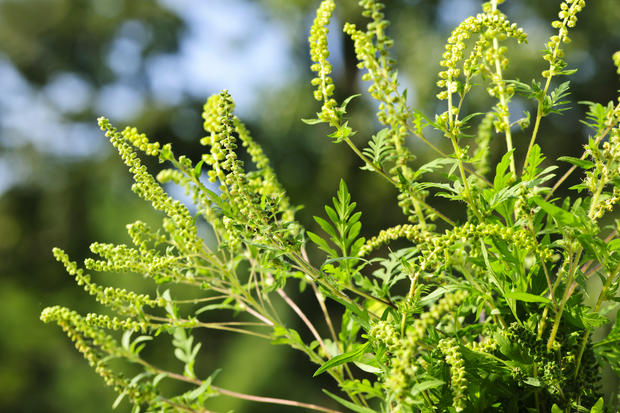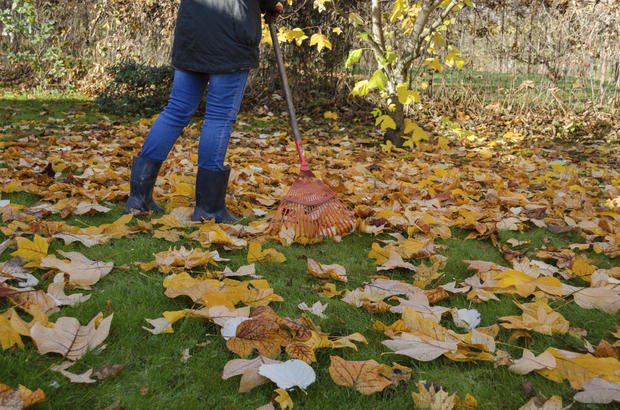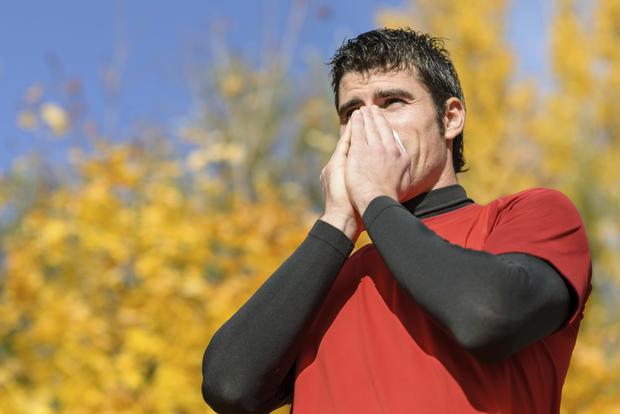7 tips to tackle fall allergies
By ILENE MANACHER
The approach of fall brings a new round of allergy suffering in many parts of the country.
The yellowish-greenish ragweed plant is a leading source of itchy, sneezy misery for many. As many as 30 percent of people have allergic rhinitis (that is, hay fever), and about a third of them are allergic to ragweed pollen, according to Dr. Timothy Craig, an allergist and professor of medicine and pediatrics at Penn State University in Hershey, Pennsylvania.
"The thing with ragweed is it's just such a big pollen producer," Craig told CBS News. "That's why it's such an issue for people east of the Rocky Mountains."
In fact, experts say a single ragweed plant can produce up to a billion pollen grains in a season. It typically begins in mid-August and peaks in mid-September. Many experts say mild springs and late frosts are making the season last even longer.
And if the pollen doesn't get you, watch out for fall molds, another allergy culprit. They grow on wet leaves and decomposing plants.
"Not only do you have ragweed, which is the most common allergen," Craig noted, "on top of that another 15 percent are sensitive to Alternaria and the other outdoor molds. So it's a major problem for people this time of year."
What's an allergy sufferer to do? Read on for some expert advice on how to deal with fall allergies...
Reduce your exposure
The best way to keep allergies in check is to avoid those offending triggers. That's no surprise, but it can be easier said than done.
To reduce your exposure to pollen, keep windows closed and the air conditioner on. And don't forget to change filters regularly, about every month.
When you're out and about, keep car windows rolled up, too. "When you're driving in the car, you're just collecting lots of pollen, so that's the worst thing you can do is drive with windows open," says Craig.
Monitor pollen and mold counts
Another helpful strategy: keep an eye on pollen and mold counts so you can try to stay indoors on especially bad days. The National Allergy Bureau, part of the American Academy of Allergy Asthma & Immunology, tracks levels around the country.
And, watch the weather.
"In general, if you look at people with allergies, they're much better on damp, wet days with nice drizzle," says Craig. "If it's going to be a warm, windy, dry day which is sunny, that's when you know that the ragweed's going to be high."
Time your workouts
If you're planning a workout, time it right. "Usually people allergic to ragweed do much better if they do their exercise early in the morning before the winds pick up," Craig notes.
Avoid yard work
Allergies are a good excuse to avoid doing yard work, like raking leaves or mowing lawns. "People who are allergic to molds, especially, shouldn't be raking leaves," Craig cautions. "It's really a hazard to do."
Shower off pollen
When you come inside, rinse off and change your clothes. "Shower to get all the pollen off of you so you're not bringing it in the house and bringing it in to the bed when you're sleeping," says Craig. "That's very, very important."
Take your medicine
If avoiding the things that make you sneeze isn't enough, experts agree that over-the-counter antihistamines do a good job of controlling symptoms. Check with an allergist for advice on over-the-counter or prescription medications, inhalers, nasal sprays and eyedrops that may work for you.
But here's a tip: Craig advises the best time to start is before symptoms like stuffy noses or itchy eyes kick in.
"When you preempt the season you do much better than if you wait until you're already symptomatic," he says. "So you can get an idea when to start the medications based on the year before, when the pollens started to be identified on pollen counters."
What to do when all else fails
When all else fails, experts say consider immunotherapy or allergy shots.
Craig advises "allergy vaccines work very well for people who aren't well-controlled on medication, or people who have adverse effects to medications, or people who hate medication."







